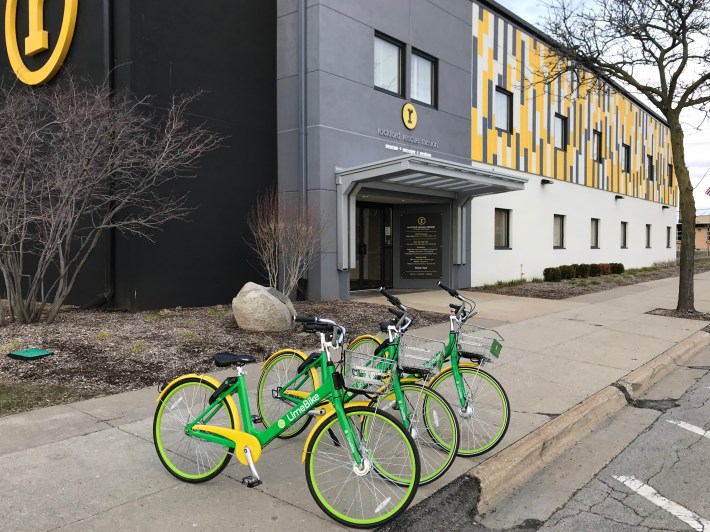After months of radio silence about whether Chicago will let dockless bike-share come to town, last week city officials finally confirmed that they met with vendors and are considering launching a pilot in the near future. And earlier this month San Mateo-based dockless purveyor LimeBike rolled out a 500-cycle system in Rockford, Illinois, best known as the home of power-pop legends Cheap Trick, giving Chicagoans a chance to test-ride the technology.
Dockless bike-share, aka DoBi (“Dough Bee”) lets members use a smartphone app to locate and check out cycles and park them anywhere in the service area. The dockless companies, propped up by venture capital, offer cheap rental rates, generally $1 for a half-hour trip, compared to $3 for a single Divvy journey.
The Chicago-based transportation justice group Equiticity has argued that dockless technology should be deployed immediately to bring shared bikes to outlying communities that don’t yet have Divvy stations. “How soon are y’all able to bring [dockless] bikes to our city to address the unmet need for black and brown people to have bikes in their neighborhoods?” Equiticity founder Oboi Reed asked at last December’s Mayor’s Bicycle Advisory Council meeting.
During that hearing, Chicago Department of Transportation deputy commissioner Sean Wiedel said the city planned to invite dockless vendors to present their business models within a month or two. I asked the department for updates several times after that, but it wasn’t until last week that spokesman Mike Claffey confirmed that officials recently met with DoBi companies

“We will be assessing their operational impacts and their business models to ensure that we can advance the city’s transportation goals of providing safe and affordable transportation options for all Chicagoans,” Claffey said via email. In addition to preventing dockless cycles from becoming tripping hazards or eyesores, officials doubtless want to keep DoBi vendors from undercutting Divvy and driving it out of business.
To that end, former Active Transportation Alliance director Randy Neufeld, now with the SRAM Cycling Fund, has asserted that dockless bikes should be confined to parts of Chicago that don’t currently have bike-share. It looks like New York City may take this approach.
The current Active Trans leadership doesn’t share Neufeld’s opinion that dockless should be limited to non-Divvy neighborhoods. But they do feel that the Chicago should charge the companies for use of the public way and use the revenue to fund new bike infrastructure, especially in neighborhoods with few relatively few lanes and racks, said governmental affairs director Kyle Whitehead.
According to a dockless bike-share professional who asked not to be named, in March CDOT staff hosted a meeting with representatives of several DoBi companies, including Santa Monica-based CycleHop, Jump Bikes from NYC (which was recently purchased by Uber), LimeBike, Beijing-based Ofo, San-Francisco-based Spin, and Zagster, from Cambridge, Massachusetts.

Gabriel Scheer, director of strategic development for LimeBike, told me that at the info session city staffers asked the vendors how they planned to serve all parts of Chicago equitably, and how they would provide access for people without smartphones or credit cards. The officials also asked how the companies would ensure their bikes didn’t create conflict with other public space uses. “Basically they wanted to know, do you play well with others,” Scheer said.
Ofo spokesman Taylor Bennett also confirmed that his firm had a rep at the meeting. Ofo and Jump have provided cycles for the low-tech “bike libraries” that Equiticity and neighborhood groups will be launching on the far south side and in North Lawndale this spring. “We continue to work closely with the city to build on this effort, and we’re eager to extend our affordable and accessible bike sharing platform to even more Chicagoans," Bennett said. Jump and Spin didn’t return messages, and I learned of CycleHop’s and Zagster’s involvement shortly before press time.
LimeBike has an exclusive three-year contract with Rockford, but the service also coexists with other dockless companies in cities like Seattle, Dallas, and Washington, D.C., which, like Chicago, already had a thriving docked system. Scheer said his company is open to either model in Chicago.
However, another dockless professional who requested anonymity (who knew that the DoBi biz was so cloak-and-dagger?) said there’s concern among industry members that if Chicago wants to have an exclusive dockless concessionaire, LimeBike might have an unfair advantage. Former Rahm Emanuel advisor David Spielfogel, who, as the mayor’s right-hand man, was nicknamed “Mini-Rahm,” sits on the company’s advisory board. In addition, ex-CDOT deputy commissioner Scott Kubly left his post as Seattle transportation chief in March to run LimeBike’s government operations. (Former CDOT commissioner Gabe Klein is on Spin’s advisory board.) “Companies are hoping that there would be a transparent [request for proposals] to shine a light on the process,” the professional said.

LimeBike spokeswoman Emma Green called the concern a “non-issue,” claiming that neither Spielfogel or Kubly is lobbying in Chicago, and added that Kubly left CDOT more than four years ago. CDOT’s Claffey declined to comment on the subject.
The company launched its Rockford fleet on April 7. To check out an example of a midwestern dockless system, and get a sense of what issues might arise when DoBi first comes to Chicago, I hopped a Van Galder bus from O’Hare to this former tool-and-die center of roughly 150,000 people, affectionately nicknamed Screw City.
I met up with local LimeBike staffers Will Piper and Gwen Jones at the 1927 Coronado Theater, a striking blend of Art Deco and Spanish Baroque architecture, for a bike tour. As we pedaled, several pedestrians and motorists called out questions about what the bikes are for and how to rent them.
After chatting with a few LimeBike users, who seemed stoked about the service, in the hipster-friendly East State Street retail strip, we took a spin north on the lovely path along the Rock River. We stopped for the obligatory photo op at Alexander Liberman’s tomato soup-colored “Symbol” sculpture. As we returned south, a jogger yelled “Go LimeBike! Making Rockford better.”

All is not peaches and cream, however. A couple times during our journey Piper stopped to relocate bikes that were partially obstructing the sidewalk. And the next day I saw local news reports of pranksterism: LimeBikes have been spotted stuffed into a planter and hanging from a tree.
Still, there’s one guy who’s confident that LimeBike will be a shot in the arm for the city: Cheap Trick lead guitarist Rick Nielsen. He still lives in Rockford and is a bike enthusiast himself. He sponsored Olympic gold medal-winning triathlete Melanie Valerio by commissioning a carbon fiber cycle for her, plastered all over with the band’s logo, of course. He’s planning to loan the bike to Republican ambassador to New Zealand and Cheap Trick superfan Scott Brown, with whom Nielsen is friendly despite political differences.
Nielsen told me he plans to start using bike-share soon. “LimeBike should be great for Rockford once people know what it is,” he said. “Anything that brings positive attention to the town is a good thing in my book.”
Dockless bike-share could have similarly beneficial effect for Chicago neighborhoods that don’t have Divvy docks. So “Come On, Come On” CDOT, let’s give it a try.






